人教版(2019)选择性必修第三册Unit 1 Art Learning About Language 课件(共16张PPT)
文档属性
| 名称 | 人教版(2019)选择性必修第三册Unit 1 Art Learning About Language 课件(共16张PPT) | 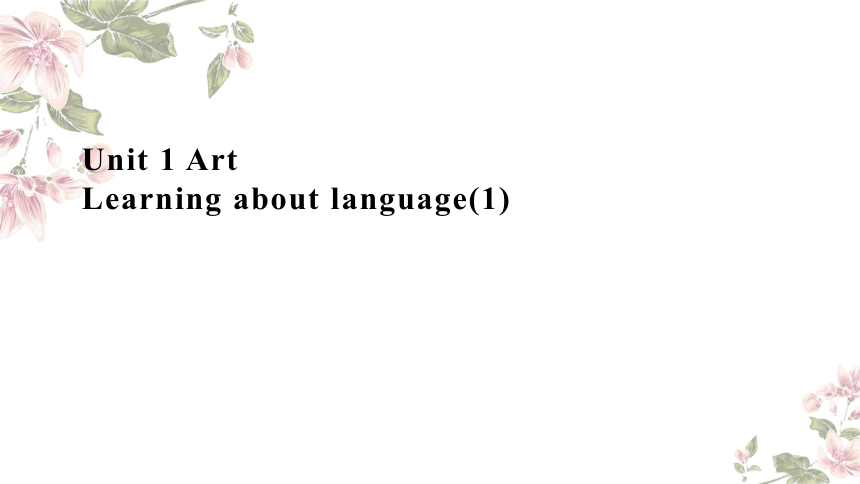 | |
| 格式 | pptx | ||
| 文件大小 | 475.1KB | ||
| 资源类型 | 教案 | ||
| 版本资源 | 人教版(2019) | ||
| 科目 | 英语 | ||
| 更新时间 | 2024-07-15 16:47:37 | ||
图片预览

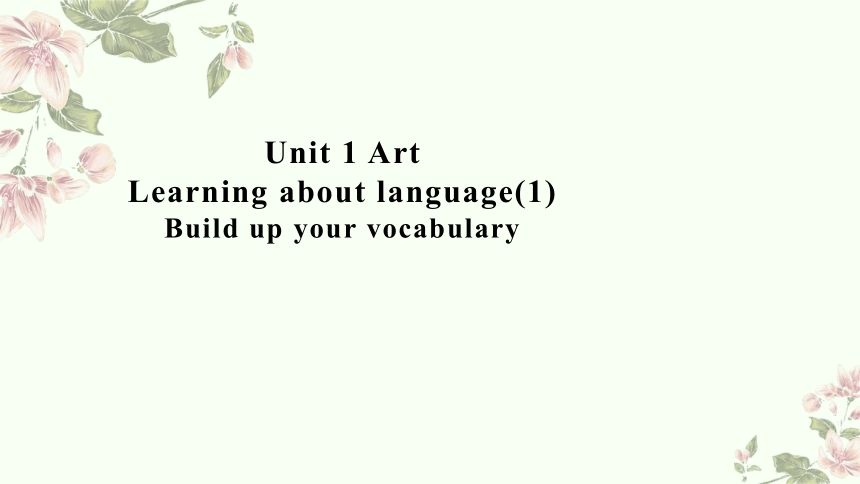
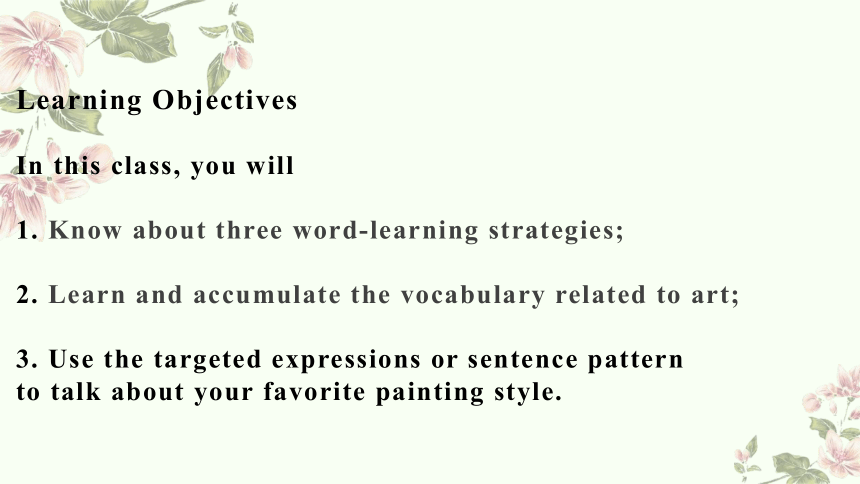
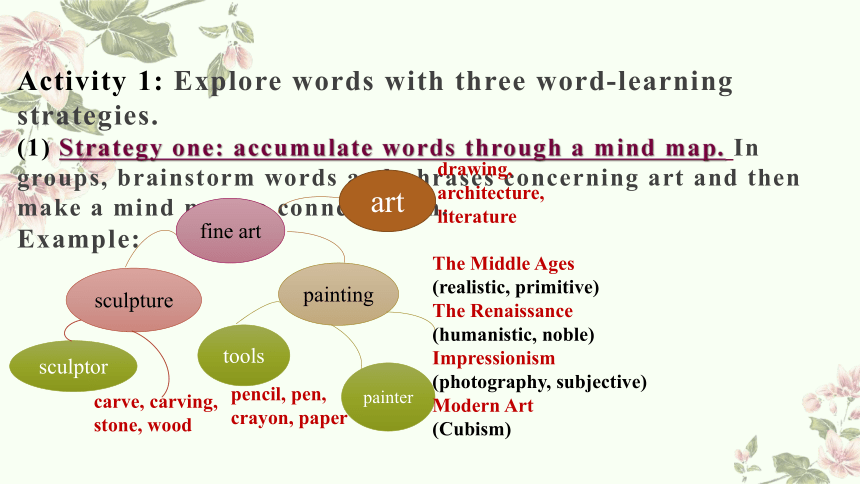
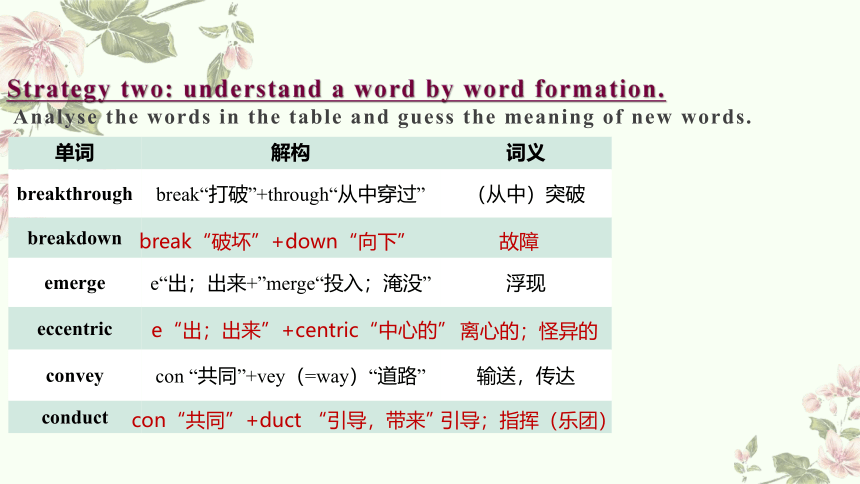
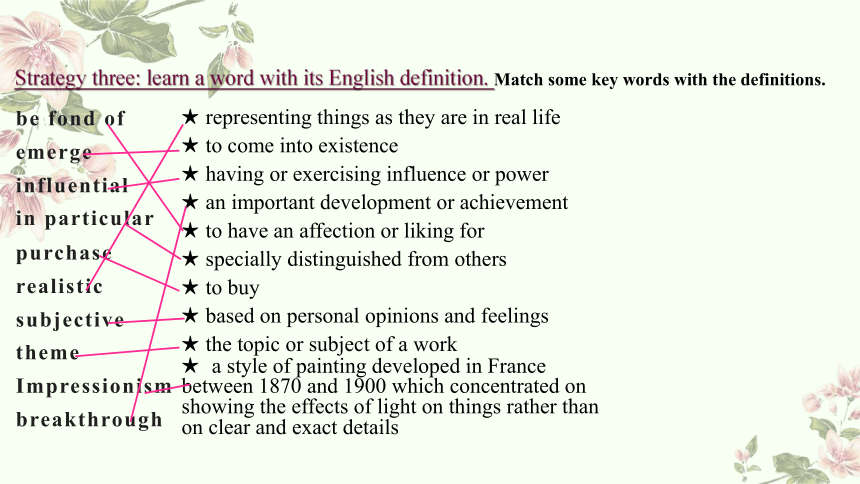
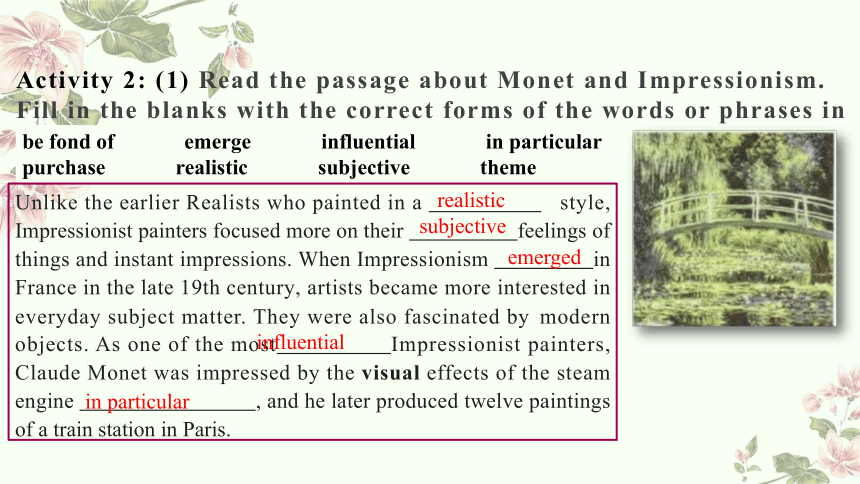
文档简介
(共16张PPT)
Unit 1 Art
Learning about language(1)
Unit 1 Art
Learning about language(1)
Build up your vocabulary
Learning Objectives
In this class, you will
1. Know about three word-learning strategies;
2. Learn and accumulate the vocabulary related to art;
3. Use the targeted expressions or sentence pattern
to talk about your favorite painting style.
Activity 1: Explore words with three word-learning strategies.
(1) Strategy one: accumulate words through a mind map. In groups, brainstorm words and phrases concerning art and then make a mind map to connect them.
Example:
fine art
sculpture
painting
tools
painter
sculptor
art
drawing,
architecture,
literature
carve, carving,
stone, wood
pencil, pen,
crayon, paper
The Middle Ages
(realistic, primitive)
The Renaissance
(humanistic, noble)
Impressionism
(photography, subjective)
Modern Art
(Cubism)
Strategy two: understand a word by word formation.
Analyse the words in the table and guess the meaning of new words.
单词 解构 词义
breakthrough break“打破”+through“从中穿过” (从中)突破
breakdown
emerge e“出;出来+”merge“投入;淹没” 浮现
eccentric
convey con “共同”+vey(=way)“道路” 输送,传达
conduct
break“破坏”+down“向下”
e“出;出来”+centric“中心的”
con“共同”+duct “引导,带来”
故障
离心的;怪异的
引导;指挥(乐团)
be fond of
emerge
influential
in particular
purchase
realistic
subjective
theme
Impressionism
breakthrough
★ representing things as they are in real life
★ to come into existence
★ having or exercising influence or power
★ an important development or achievement
★ to have an affection or liking for
★ specially distinguished from others
★ to buy
★ based on personal opinions and feelings
★ the topic or subject of a work
★ a style of painting developed in France between 1870 and 1900 which concentrated on showing the effects of light on things rather than on clear and exact details
Strategy three: learn a word with its English definition. Match some key words with the definitions.
Activity 2: (1) Read the passage about Monet and Impressionism.
Fill in the blanks with the correct forms of the words or phrases in the box.
be fond of emerge influential in particular
purchase realistic subjective theme
Unlike the earlier Realists who painted in a style, Impressionist painters focused more on their feelings of things and instant impressions. When Impressionism in France in the late 19th century, artists became more interested in everyday subject matter. They were also fascinated by modern objects. As one of the most Impressionist painters, Claude Monet was impressed by the visual effects of the steam engine , and he later produced twelve paintings of a train station in Paris.
realistic
subjective
emerged
influential
in particular
be fond of emerge influential in particular
purchase realistic subjective theme
In 1883, Monet and his large family moved to Giverny,where he ___________a house and some land for his gardens. During his days at Giverny, Monet __________ painting his own gardens, with the water lilies, the pond, and the arched bridge. From this we can see that there were two clear____________apparent in his work throughout his career:colours and reflections in water.
purchased
was fond of
themes
(2) Read the passage again and discuss the following questions.
1. What is the passage about
Can you use one sentence to summarize the main idea
2. Is there anything about Monet that interests you What is it
3. What else do you want to know about Monet
Some important points included in the passage:
★ representative painter and his works
★ characteristics
Impressionism
★ development
★ subject/theme
(3) Underline the useful expressions and sentence pattern in the passage that are used to describe the key points.
★ characteristics
★ development
★ subject/theme
★ representative painter and his works
Unlike..., ... painters focuses more on...
When...emerged in..., artists became more interested in......
As one of the most influential painters,...was impressed by...
...was fond of...
Activity 3: Review the text in Reading and Thinking section. Create a mind map of your favourite painting style and share it with your partner.
For instance, “The Renaissance” mind map:
★ representative painter and his works
★ characteristics
The
Renaissance
★ development
★ subject/theme
people and the world
historical events
stories from mythology
· more humanistic attitude
·use of perspective
·use of oil paints
Masaccio , Leonardo da Vinci, Michelangelo, Rembrandt...
Activity 4: Use the useful expressions and sentence pattern to describe your mind map.
Unlike..., ... painters focuses more on...
When...emerged in..., artists became more interested in...
As one of the most influential painters,...was impressed by..
...was fond of...
Activity 5: Use the useful expressions and sentence pattern to describe your mind map.
Example:
Unlike artists in the middle ages, Renaissance painters focuses more on a humanistic attitude to life. When this style emerged in the 14th century, artists became more interested in people and the world around us. An important breakthrough during this period was the use of perspective and another innovation was the use of oil paints. As one of the most influential painters, Rembrandt was fond of deep colours and realism, who gained a reputation as a master of shadow and light.
Summary
Today, we have learnt
1. Three word-learning strategies:
(1)Accumulate words through a mind map
(2)Understand a word by word formation
(3)Learn a word with its English definition;
2. Vocabulary related to art;
3. Useful expressions or sentence pattern to talk about
your favorite painting style.
Homework
Work in groups. Look up each group of words in the dictionary and discuss their differences.
Then create a blank-filling activity based on your understanding of these words.
Exchange your activity with another group and see how well you can do.
accurately/precisely/exactly rank/grade/degree realistic/practical/actual reputation/fame/popularity subsequent/later/latter
EXAMPLE
realistic/practical/actual
·You need to have realistic expectations of the returns from investments .
·The bride appeared five years younger than her actual age.
·Mr Liu has a lot of practical experience in restoring historic buildings.
Thank you!
Unit 1 Art
Learning about language(1)
Unit 1 Art
Learning about language(1)
Build up your vocabulary
Learning Objectives
In this class, you will
1. Know about three word-learning strategies;
2. Learn and accumulate the vocabulary related to art;
3. Use the targeted expressions or sentence pattern
to talk about your favorite painting style.
Activity 1: Explore words with three word-learning strategies.
(1) Strategy one: accumulate words through a mind map. In groups, brainstorm words and phrases concerning art and then make a mind map to connect them.
Example:
fine art
sculpture
painting
tools
painter
sculptor
art
drawing,
architecture,
literature
carve, carving,
stone, wood
pencil, pen,
crayon, paper
The Middle Ages
(realistic, primitive)
The Renaissance
(humanistic, noble)
Impressionism
(photography, subjective)
Modern Art
(Cubism)
Strategy two: understand a word by word formation.
Analyse the words in the table and guess the meaning of new words.
单词 解构 词义
breakthrough break“打破”+through“从中穿过” (从中)突破
breakdown
emerge e“出;出来+”merge“投入;淹没” 浮现
eccentric
convey con “共同”+vey(=way)“道路” 输送,传达
conduct
break“破坏”+down“向下”
e“出;出来”+centric“中心的”
con“共同”+duct “引导,带来”
故障
离心的;怪异的
引导;指挥(乐团)
be fond of
emerge
influential
in particular
purchase
realistic
subjective
theme
Impressionism
breakthrough
★ representing things as they are in real life
★ to come into existence
★ having or exercising influence or power
★ an important development or achievement
★ to have an affection or liking for
★ specially distinguished from others
★ to buy
★ based on personal opinions and feelings
★ the topic or subject of a work
★ a style of painting developed in France between 1870 and 1900 which concentrated on showing the effects of light on things rather than on clear and exact details
Strategy three: learn a word with its English definition. Match some key words with the definitions.
Activity 2: (1) Read the passage about Monet and Impressionism.
Fill in the blanks with the correct forms of the words or phrases in the box.
be fond of emerge influential in particular
purchase realistic subjective theme
Unlike the earlier Realists who painted in a style, Impressionist painters focused more on their feelings of things and instant impressions. When Impressionism in France in the late 19th century, artists became more interested in everyday subject matter. They were also fascinated by modern objects. As one of the most Impressionist painters, Claude Monet was impressed by the visual effects of the steam engine , and he later produced twelve paintings of a train station in Paris.
realistic
subjective
emerged
influential
in particular
be fond of emerge influential in particular
purchase realistic subjective theme
In 1883, Monet and his large family moved to Giverny,where he ___________a house and some land for his gardens. During his days at Giverny, Monet __________ painting his own gardens, with the water lilies, the pond, and the arched bridge. From this we can see that there were two clear____________apparent in his work throughout his career:colours and reflections in water.
purchased
was fond of
themes
(2) Read the passage again and discuss the following questions.
1. What is the passage about
Can you use one sentence to summarize the main idea
2. Is there anything about Monet that interests you What is it
3. What else do you want to know about Monet
Some important points included in the passage:
★ representative painter and his works
★ characteristics
Impressionism
★ development
★ subject/theme
(3) Underline the useful expressions and sentence pattern in the passage that are used to describe the key points.
★ characteristics
★ development
★ subject/theme
★ representative painter and his works
Unlike..., ... painters focuses more on...
When...emerged in..., artists became more interested in......
As one of the most influential painters,...was impressed by...
...was fond of...
Activity 3: Review the text in Reading and Thinking section. Create a mind map of your favourite painting style and share it with your partner.
For instance, “The Renaissance” mind map:
★ representative painter and his works
★ characteristics
The
Renaissance
★ development
★ subject/theme
people and the world
historical events
stories from mythology
· more humanistic attitude
·use of perspective
·use of oil paints
Masaccio , Leonardo da Vinci, Michelangelo, Rembrandt...
Activity 4: Use the useful expressions and sentence pattern to describe your mind map.
Unlike..., ... painters focuses more on...
When...emerged in..., artists became more interested in...
As one of the most influential painters,...was impressed by..
...was fond of...
Activity 5: Use the useful expressions and sentence pattern to describe your mind map.
Example:
Unlike artists in the middle ages, Renaissance painters focuses more on a humanistic attitude to life. When this style emerged in the 14th century, artists became more interested in people and the world around us. An important breakthrough during this period was the use of perspective and another innovation was the use of oil paints. As one of the most influential painters, Rembrandt was fond of deep colours and realism, who gained a reputation as a master of shadow and light.
Summary
Today, we have learnt
1. Three word-learning strategies:
(1)Accumulate words through a mind map
(2)Understand a word by word formation
(3)Learn a word with its English definition;
2. Vocabulary related to art;
3. Useful expressions or sentence pattern to talk about
your favorite painting style.
Homework
Work in groups. Look up each group of words in the dictionary and discuss their differences.
Then create a blank-filling activity based on your understanding of these words.
Exchange your activity with another group and see how well you can do.
accurately/precisely/exactly rank/grade/degree realistic/practical/actual reputation/fame/popularity subsequent/later/latter
EXAMPLE
realistic/practical/actual
·You need to have realistic expectations of the returns from investments .
·The bride appeared five years younger than her actual age.
·Mr Liu has a lot of practical experience in restoring historic buildings.
Thank you!
